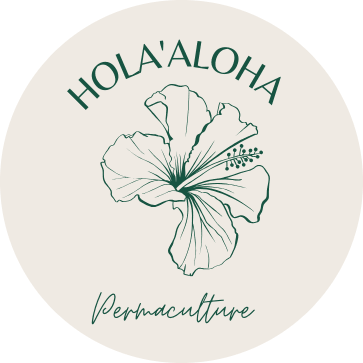The Benefits of Permaculture: Sustainable Agriculture for a Greener Future

Posted on February 26th, 2024
In today's world, where environmental degradation and food insecurity are pressing concerns, the adoption of sustainable agricultural practices is more crucial than ever. Permaculture, a holistic approach to land management inspired by natural ecosystems, offers a promising solution for building a greener future. At Hola'aloha, we believe in the transformative power of permaculture to not only sustainably feed communities but also to regenerate ecosystems and promote resilience. Let's explore the myriad benefits of permaculture and its potential to shape a more sustainable world.
Enhanced Soil Health and Fertility
One of the fundamental principles of permaculture is soil regeneration. By nurturing healthy soil ecosystems through practices such as composting, mulching, and no-till cultivation, permaculturists create fertile ground that supports abundant plant growth. Unlike conventional agriculture, which often relies on chemical inputs that degrade soil quality over time, permaculture builds soil health naturally, fostering a thriving microbial community that aids in nutrient cycling and water retention.
The result? Lush, productive landscapes that are resistant to erosion and drought ensure long-term agricultural viability. Moreover, healthy soil sequesters carbon from the atmosphere, mitigating the effects of climate change while promoting biodiversity and ecosystem stability. By prioritizing soil health, permaculture systems create a foundation for sustainable agriculture that benefits both people and the planet.
Biodiversity Conservation
In permaculture, diversity is key. By mimicking the structure and function of natural ecosystems, permaculturists cultivate a wide variety of plants and animals, creating resilient food forests and polyculture gardens. This biodiversity not only provides a more stable and resilient food supply but also supports a multitude of beneficial ecological interactions.
From pest control and pollination to soil fertility and water purification, diverse ecosystems are better equipped to adapt to environmental changes and disturbances, ultimately promoting ecological balance and stability. Furthermore, diverse cropping systems reduce the risk of crop failure due to pests or disease, enhancing food security and ensuring a more stable food supply for communities. Through biodiversity conservation, permaculture fosters resilience and sustainability in agricultural systems, creating landscapes that are better able to withstand the challenges of a changing climate.
Water Conservation and Management
In a world facing increasing water scarcity, efficient water management is paramount. Permaculture offers a suite of strategies for harvesting, storing, and conserving water in the landscape. Techniques such as rainwater harvesting, swales, and contour mulching help capture and retain precious moisture, replenish groundwater reserves and mitigate the effects of drought.
By maximizing the use of natural water cycles and minimizing runoff, permaculture not only conserves water resources but also reduces the risk of flooding and erosion, creating more resilient landscapes in the face of climate change. Moreover, water-efficient irrigation systems such as drip irrigation and wicking beds minimize water waste while maximizing plant uptake, ensuring that every drop counts in water-stressed environments. Through water conservation and management, permaculture promotes sustainable land-use practices that protect precious water resources while supporting thriving ecosystems and communities.
Regenerative Agriculture Practices
At the heart of permaculture lies the concept of regenerative agriculture—the idea that agriculture can not only sustain but also improve the health of ecosystems over time. By working with nature rather than against it, permaculturists harness the power of ecological processes to regenerate degraded landscapes, restoring soil fertility, enhancing biodiversity, and sequestering carbon.
Through practices such as agroforestry, rotational grazing, and cover cropping, permaculture systems not only produce food but also contribute to the restoration of ecosystems, making them invaluable tools in the fight against climate change and environmental degradation. Furthermore, regenerative agriculture enhances ecosystem services such as pollination, pest control, and soil formation, creating landscapes that are not only productive but also resilient and sustainable in the long term. By prioritizing regenerative practices, permaculture promotes a regenerative approach to agriculture that benefits both people and the planet, creating landscapes that are healthier, more productive, and more resilient in the face of environmental challenges.
Community Resilience and Food Security
In an increasingly uncertain world, community resilience and food security are of utmost importance. Permaculture empowers communities to take control of their food systems, providing them with the knowledge and skills needed to produce healthy, nutritious food locally and sustainably. By decentralizing food production and promoting self-reliance, permaculture reduces dependence on global supply chains and strengthens local economies.
Furthermore, by fostering connections between people and the land, permaculture builds social cohesion and resilience, creating communities that are better equipped to weather the challenges of the future. Through initiatives such as community gardens, farmers' markets, and food forests, permaculture promotes food sovereignty and food justice, ensuring that all members of the community have access to fresh, healthy food. By prioritizing community resilience and food security, permaculture fosters thriving, self-reliant communities that are better able to withstand the uncertainties of the future while promoting social equity and environmental sustainability.
Conclusion
Permaculture offers a holistic approach to agriculture that holds tremendous potential for building a greener, more sustainable future. From enhancing soil health and biodiversity to conserving water resources and promoting community resilience, the benefits of permaculture are vast and far-reaching. At Hola'aloha, we are committed to harnessing the power of permaculture to create thriving ecosystems, resilient communities, and a more sustainable world. If you're interested in learning more about permaculture or exploring how you can incorporate its principles into your own life, don't hesitate to reach out to us at [email protected]. Together, let's cultivate a brighter future for all.
Contact
Cultivate Sustainability Today
Reach out to Hola'aloha and take the first step towards cultivating a sustainable future. Whether you have questions about our permaculture services or want to collaborate on a project, our team is here to support you.
